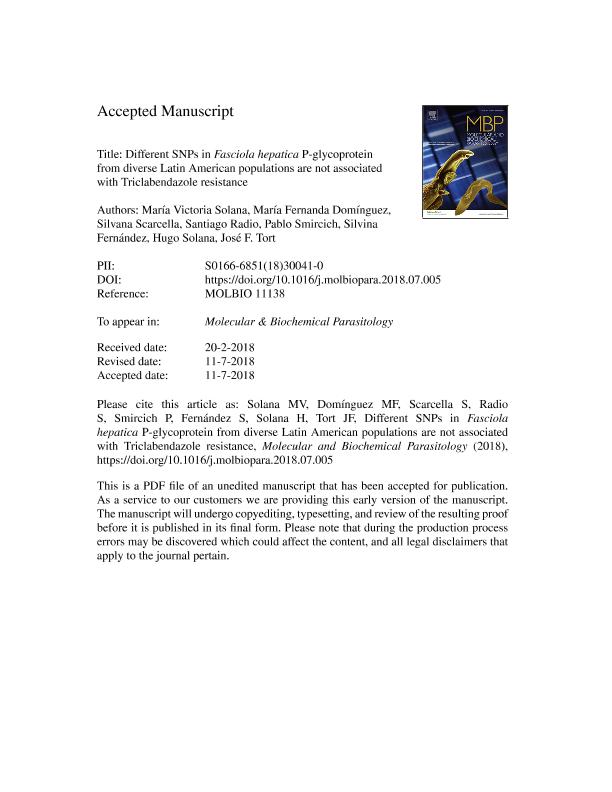Artículo
Different SNPs in Fasciola hepatica P-glycoprotein from diverse Latin American populations are not associated with Triclabendazole resistance
Solana, María Victoria ; Domínguez, María Fernanda; Scarcella, Silvana Andrea
; Domínguez, María Fernanda; Scarcella, Silvana Andrea ; Radio, Santiago; Smircich, Pablo; Fernández, Silvina; Solana, Hugo; Tort, José F.
; Radio, Santiago; Smircich, Pablo; Fernández, Silvina; Solana, Hugo; Tort, José F.
 ; Domínguez, María Fernanda; Scarcella, Silvana Andrea
; Domínguez, María Fernanda; Scarcella, Silvana Andrea ; Radio, Santiago; Smircich, Pablo; Fernández, Silvina; Solana, Hugo; Tort, José F.
; Radio, Santiago; Smircich, Pablo; Fernández, Silvina; Solana, Hugo; Tort, José F.
Fecha de publicación:
09/2018
Editorial:
Elsevier Science
Revista:
Molecular and Biochemical Parasitology
ISSN:
0166-6851
Idioma:
Inglés
Tipo de recurso:
Artículo publicado
Clasificación temática:
Resumen
The use of Triclabendazole for controlling fasciolosis is compromised by increased drug resistance affecting livestock and humans. Although the mode of action of TCBZ is still unknown, putative candidates and markers of resistance have been advanced. A single nucleotide polymorphism (T687 G) in F. hepatica PGP was proposed as marker of resistance in a small scale study of European susceptible and resistant flukes, but the association was not found in Australian samples. The T687 G SNP was absent in more than 40 samples from 2 TCBZ-resistant and 3 susceptible isolates across Latin America here analyzed. While the American samples showed more variable SNPs than the previous ones, none of the SNPs detected showed a marked association with resistance. Analyzing the 42 kb of the FhPGP gene based on RNAseq data highlights that the variation has been underestimated, suggesting that more detailed efforts are needed in order to identify markers of resistance.
Archivos asociados
Licencia
Identificadores
Colecciones
Articulos(CIVETAN)
Articulos de CENTRO DE INVESTIGACION VETERINARIA DE TANDIL
Articulos de CENTRO DE INVESTIGACION VETERINARIA DE TANDIL
Citación
Solana, María Victoria; Domínguez, María Fernanda; Scarcella, Silvana Andrea; Radio, Santiago; Smircich, Pablo; et al.; Different SNPs in Fasciola hepatica P-glycoprotein from diverse Latin American populations are not associated with Triclabendazole resistance; Elsevier Science; Molecular and Biochemical Parasitology; 224; 9-2018; 57-60
Compartir
Altmétricas



